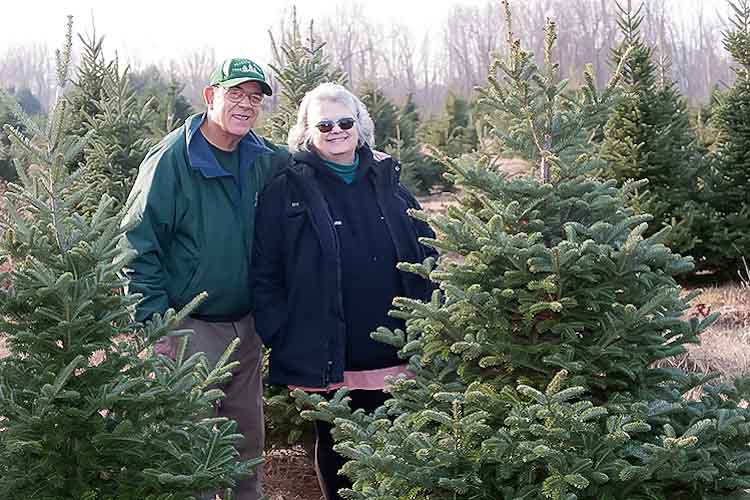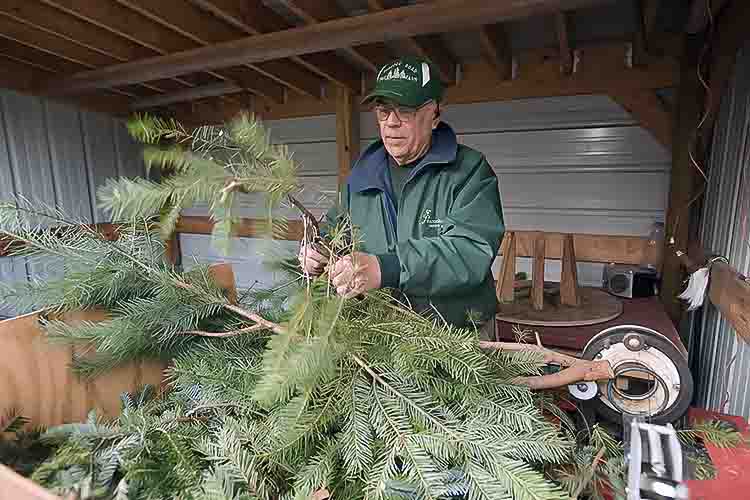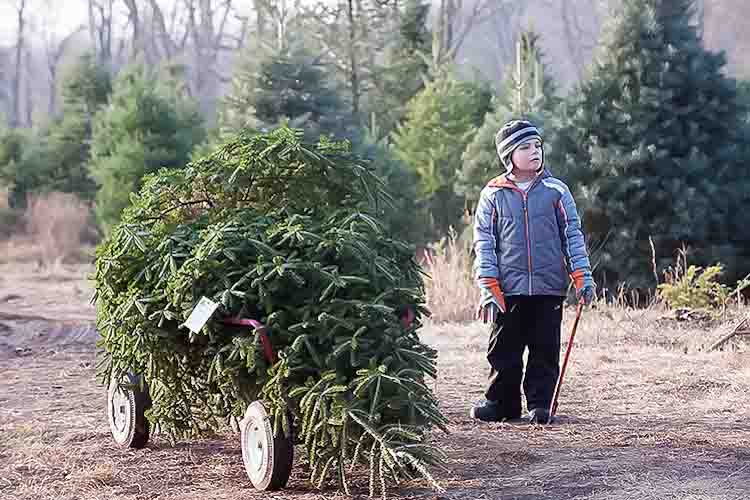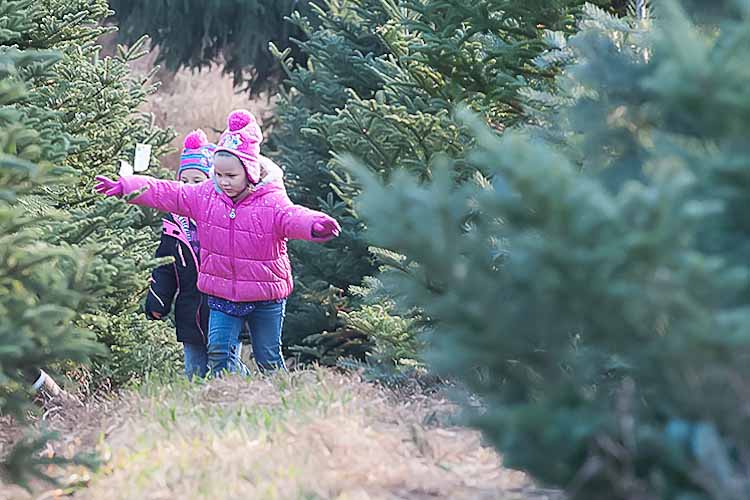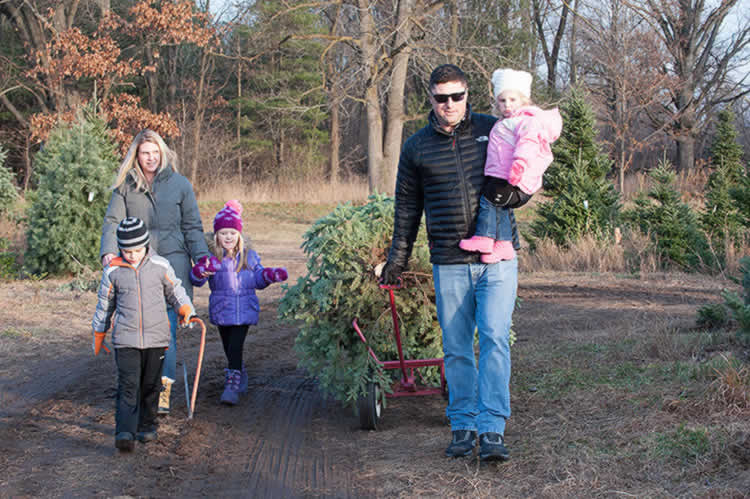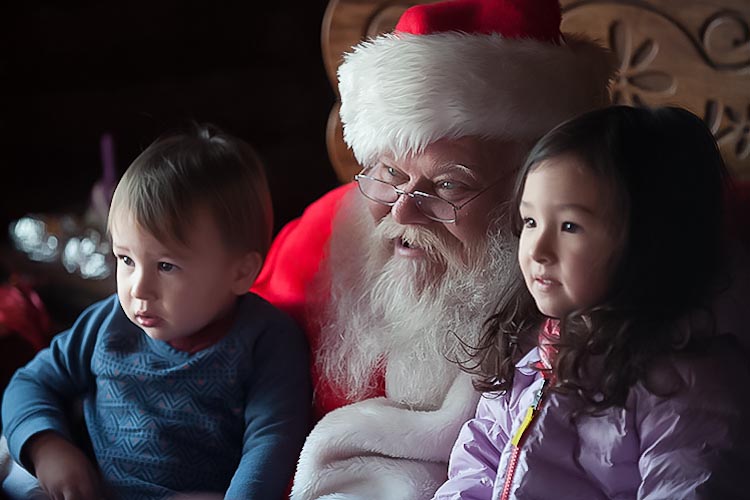Michigan tree farms keep Christmas real
Michigan tree farms are the place to make Christmas memories and part of Michigan's growing agritourism economy.
Diana and Ed Carpenter bought 180 acres 31 years ago on a dream. They hoped the seedlings they planted would end up in thousands of homes someday as family Christmas trees.
Their dream–along with years of hard work and a little good timing–led to the creation of a holiday agritourism destination known as Peacock Road Family Farm in Laingsburg, northeast of Lansing.
The farm is a place visitors can have the first-hand experience of cutting their own Christmas tree out in the field, get a little food, shop in a Christmas-themed store, pick out fresh Michigan wreaths made on-site, and ride on a full-sized train car on wheels out to a cabin to visit Santa and whisper to him their wish list.
Farmers, like the Carpenters, make a trip to the local farm into a full-fledged holiday entertainment experience and are a bright spot of growth for the Michigan Christmas tree industry. The industry, overall, is expected to have a great year, an industry spokeswoman says.
“We are doing what we set out to do when we bought the farm,” Diana Carpenter says. “We set out to be a place where people make memories, and we wanted to give back to the community by exposing people to a farm. A lot of people don’t get that experience anymore, and we have many people who thank us for allowing them to have that experience.”
The Carpenters, along with an estimated 700 tree farms throughout Michigan, expect to have a great year as people opt for real trees. In addition, they anticipate growth in their business as more people turn trips to the tree farm into a holiday tradition, and as more people grasp the impact of buying local.
Michigan’s Christmas tree industry is a vast endeavor. There are smaller growers like the Carpenters who emphasize the local experience. On the other end of the spectrum, are farmers who work on 1,000 or more acres sending truckloads of Michigan-grown Christmas trees all over the nation. In total, Michigan tree farmers will harvest three million trees this year, making it the third largest producing state in the nation.
The total number of acres and the number of tree farmers has dropped over the years, which is the trend in agriculture overall. But a modest increase in demand has made the market tight nationally. That’s good for tree farmers and it bodes well for industry growth in the future, says Marsha Gray, Michigan Christmas Tree Association executive director.

“Our growth area is agritourism,” Gray says. “Whether it’s berries, pumpkins, apple orchards. That segment of our industry has reported strong growth. With Christmas trees, the choose-and-cut farms are getting a lot of traffic.”
Among Michigan’s large-scale wholesale growers, Rex and Jessica Korsen will ship 50,000 trees to locations as far south as Aberdeen, Texas, and as far west as Denver, Colorado this season.
“It’s a really great feeling to know that for all the stress we go through someone is getting a tree for their home or a wreath for the door to greet people,” Jessica Korson says. The Korsons also sell trees directly onsite.
Korson has noticed a change in the people who come out to their farm for trees in recent years, particularly younger couples with small children. They talk about the tree as the environmentally friendly choice, she says.
“No part of the tree goes to waste,” Korson says. “The branches that get cut off the bottom are used in wreaths, and the whole thing can be recycled or will decompose. Plus we are an American-made product and we are keeping dollars local.”
Plus hundreds of seasonal jobs are created. This is especially important to rural communities where jobs are generally less plentiful, Gray says. The Carpenters, for instance, employ 45 people through the peak retail season.
“The economic impact is important for our state, and it is especially important in rural communities,” Gray says.
That’s not to say it has been easy. Tree farmers still face intense competition from retailers selling artificial trees. Artificial trees created some lean years, and farmers needed to learn how to recapture market share.
Diana Carpenter says she respects people who choose to buy an artificial tree; she trusts they are making the best choice for themselves and their families. Those families can still support local agriculture by buying locally made wreaths and poinsettias grown by Michigan greenhouses.
“It’s not my place to judge,” Carpenter says. “Everyone has their reasons, but if we can get them out here for the experience and to make memories, that’s what we like to see.”
In addition to being a natural product, a Christmas tree in the field removes carbon dioxide from the air and releases oxygen during the 8 to 12 years it is growing.
Tree farmers nationwide are optimistic about a new industry marketing campaign aimed at capitalizing on the environmental and buy-local awareness, Gray says.
Tree farmers agreed to pay an assessment based on the number of trees they grow to fund a promotional campaign. The funding has led to the new marketing slogan “It’s Christmas. Keep it Real.“
They hope it boosts their industry the same way “Got Milk?” did for dairy, Gray says.
• To find a tree farm near you, visit the Michigan Christmas Tree Association at mcta.org. For holiday ideas, visit itschristmaskeepitreal.com.
Anne Hamming is a freelance writer, editor and life coach from Southwest Michigan. She is the mother of two children, a runner, and a news junkie.
This article is one of a series of stories about Michigan’s agricultural economy. It is made possible with funding from the Michigan Department of Agriculture and Rural Development. Read more in the series here.

